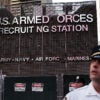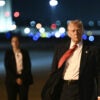With the 2014 Afghan troop withdrawal quickly approaching, a recent House Subcommittee on the Middle East and South Asia hearing stressed the need to press Pakistan to fight terrorists who find sanctuary on its soil.
In this most recent hearing, the four witnesses, including former U.S. Ambassador to Afghanistan Zalmay Khalizad, presented a united stance on the need to hold Pakistan accountable for its actions in the region. Lisa Curtis, a senior fellow for South Asia in the Asian Studies Center at The Heritage Foundation, has been encouraging the U.S. to get tough with Pakistan over its role in Afghanistan for some time.
One of the common themes of the hearing was the need for the United States to promote Afghan independence and ensure Pakistan ceases support for militant actions that would ultimately create increased security concerns for both Pakistan and Afghanistan. While there was consensus on the importance of having Pakistan fully join the U.S. in fighting terrorism, Dr. Christine Fair, an associate professor at Georgetown University, was far less optimistic about the potential for gaining such cooperation. She argued that Pakistan is directly undermining U.S. objectives in Afghanistan and that the United States should halt its decade-long policy of appeasing Pakistan.
The Daily Signal depends on the support of readers like you. Donate now
The four members of this panel seemed to share the belief that 2014 is far too soon for the United States to transfer full security responsibility to the Afghans. While Lieutenant General David Barno, former commander of U.S. and NATO forces in Afghanistan, acknowledged the importance of setting timelines for a troop drawdown, he also admitted that the U.S. had not achieved its goals for training Afghan security forces in the time frame it had set out. If the Afghans are unable to do their job now with such a large American presence, he questioned whether they would be up to the task of defending their country by the 2014 withdrawal deadline.
Dr. Ashley Tellis of the Carnegie Endowment argues that a 2014 date simply allows the Taliban and other militant groups to run down the clock until American forces leave. The best thing the U.S. could do, he said, is renounce all artificial deadlines for withdrawal from Afghanistan. But barring that, as the Administration does not seem so inclined, the United States can mitigate the problem by declaring soon exactly what the post–2014 presence in Afghanistan will look like.
Understanding the U.S. role in Afghanistan beyond 2014 is crucial to ensuring Pakistan works with us in fighting terrorism. Pakistan has a sordid past of fighting certain terrorist groups while supporting others such as the Haaqani network, which Pakistan sees as an important tool against India. As Fair put it:
The Pakistanis have become very accustomed of taking advantage of historic events by saying they support our goals but then take advantage of us and then funnel this into their own security goals. We have been fooled into thinking we have a security relationship with Pakistan.
Pakistan’s habit of supporting some terrorist groups while fighting others is crippling the U.S. ability to achieve its security objectives in the region. The time to hold Pakistan accountable for how it deals with terrorists is long past due.
Unfortunately, the United States does not have a consistent Pakistan strategy, and Fair expressed fears that at some point—when the United States returns to normal relations with Pakistan—it will continue to support violence and terrorism throughout the region. By allowing this to happen, the United States will lose the progress it has made in Afghanistan and see the continued rise of terrorist groups whose aim is to attack American interests.
Jeffrey Meyer is currently a member of the Young Leaders Program at The Heritage Foundation. For more information on interning at Heritage, please visit: http://www.heritage.org/about/departments/ylp.cfm































